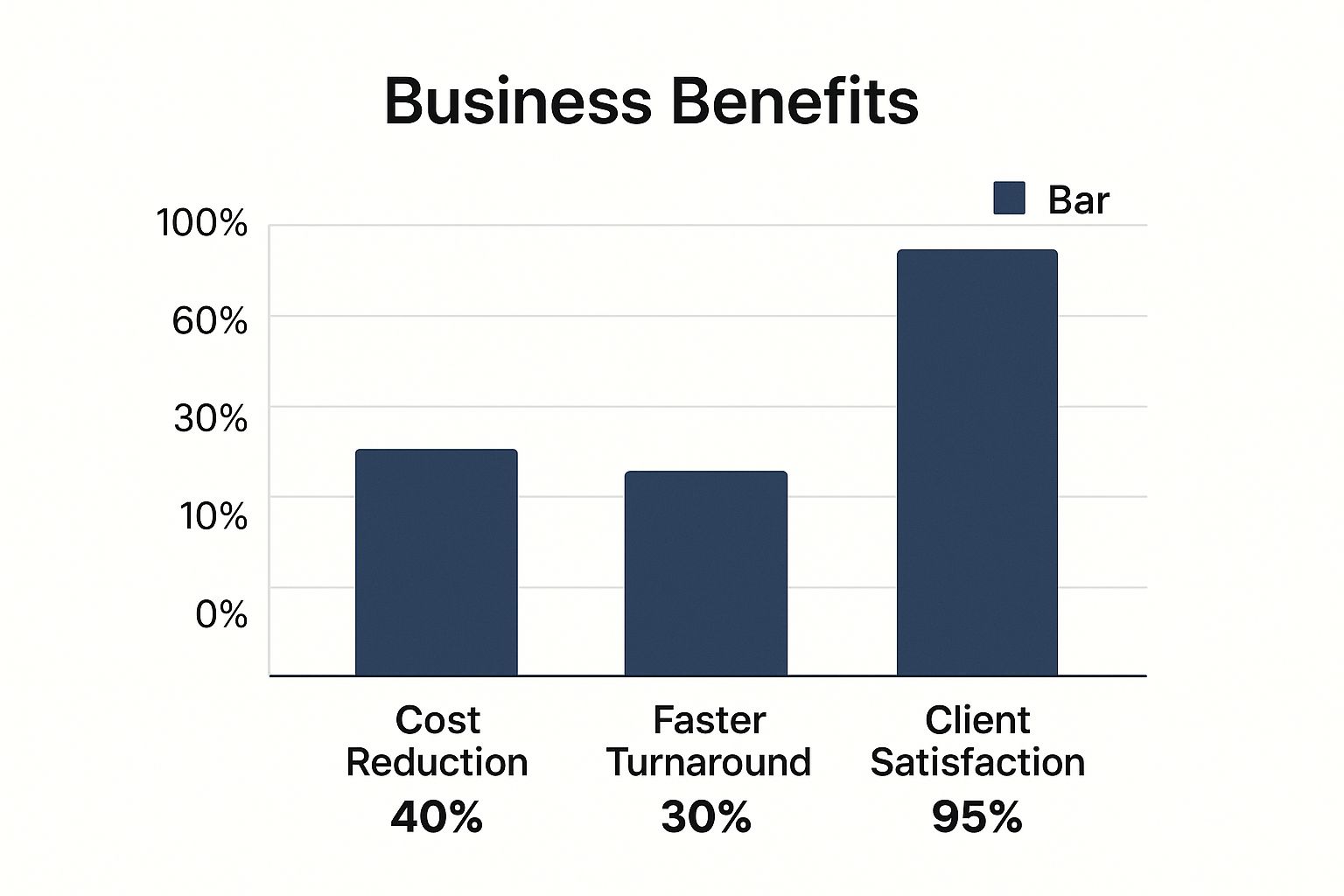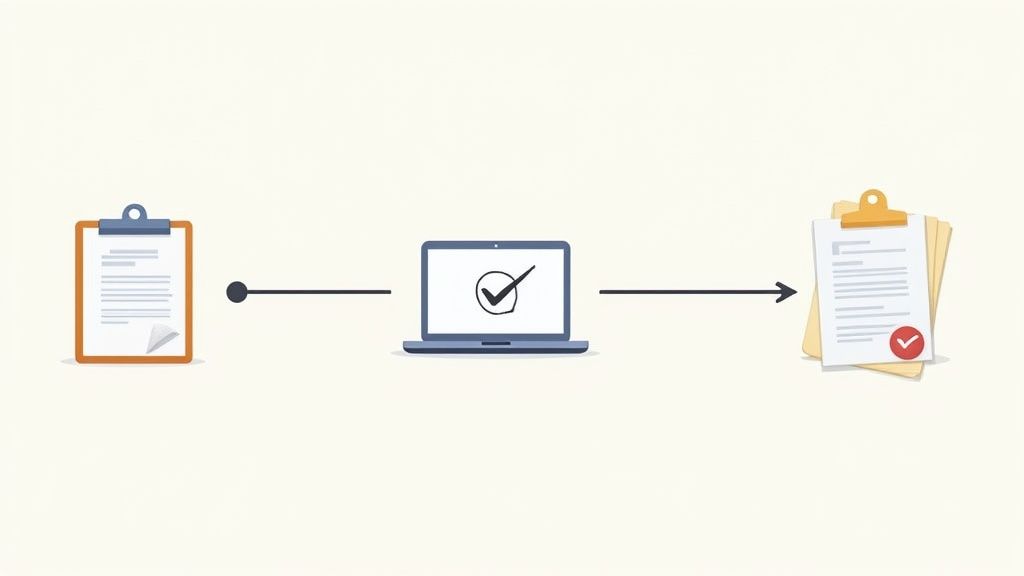
 21 minutes read
21 minutes read
That empty paralegal desk? It's more than just an empty space—it's a financial black hole for your firm. We've all been there. Staring at that chair, feeling the very real, very painful friction that comes with trying to scale a law practice the old-fashioned way. From sifting through candidates who can't tell a deposition from a discovery request to the crushing overhead that eats into every dollar you earn, the traditional hiring model is broken. I’ve lived it. It’s a nightmare.
Let's be brutally honest. That knee-jerk reaction to "just hire someone" is often the single most expensive decision a law firm can make. The moment you post a job opening, your inbox becomes a disaster zone of resumes. Hope you enjoy spending your afternoons fact-checking credentials and running endless interviews—because that’s now your full-time job.
And when you finally find someone who seems competent? Brace yourself for the financial gut punch. It’s never just the salary. You have to factor in payroll taxes, health insurance, a 401(k) match, and paid time off. Then comes the new computer, the extra software licenses, and the square footage you're leasing just for their desk. It’s a bonfire of your cash.
All said and done, that "affordable" hire actually costs 40-50% more than their base salary. It's an enormous financial commitment before they've even logged their first billable hour.
Next up is onboarding, which is where your productivity goes to die. You can spend weeks, even months, getting a new hire up to speed on your case management systems, your clients, and the unique way your firm operates. All that time you spend training is time you aren't billing. It's a massive, costly distraction disguised as a necessary evil.
This is where switching to an agile model with virtual paralegal services completely changes the game. And I'm not just saying that. The impact is significant.

The data here isn’t just about trimming expenses; it's about fundamentally improving how your firm operates. This leads directly to quicker case resolutions and, ultimately, much happier clients. Which, last I checked, is the whole point.
When you break it down, the financial difference between an in-house employee and a virtual professional is stark. The traditional model forces you to carry immense fixed costs, whether you’re swamped with casework or staring at the ceiling during a slow month. Let's look at a realistic comparison. No sugar-coating.
| Cost Factor | In-House Paralegal (Annual Estimate) | Virtual Paralegal (Equivalent Hours) |
|---|---|---|
| Average Base Salary | $55,000 | $52,000 (Based on 1,800 hours @ $29/hr) |
| Payroll Taxes (FICA, etc.) | ~$4,200 | $0 |
| Health Insurance | ~$6,500 | $0 |
| 401(k) Contribution (3% Match) | ~$1,650 | $0 |
| Paid Time Off (3 weeks) | ~$3,170 | $0 (You only pay for productive time) |
| Office Space & Utilities | ~$3,000 | $0 |
| Equipment & Software | ~$2,500 | $0 (They use their own) |
| Recruiting & Onboarding | ~$5,000 (One-time, amortized) | $0 |
| Total Annual Cost | ~$81,020 | ~$52,000 |
The table makes it painfully clear: that empty desk represents a rigid, inefficient way of thinking that holds small and mid-sized firms back. You're not just paying for work; you're paying for downtime, benefits, and infrastructure.
What if you could access elite-level talent without all that overhead? What if you could get top-tier paralegal support precisely when you need it and scale it back when you don’t? This isn't a hypothetical question—it's the core promise of virtual paralegal services. It’s time to stop paying for empty chairs and start investing in actual, measurable results.
So, what exactly are virtual paralegal services? Forget the textbook definition. If you're picturing someone just answering emails from their couch, you're missing the bigger picture. This isn't just about remote work; it's a fundamental shift in how modern law firms operate.
Think of it like this: instead of hiring a full-time, in-house chef for your kitchen, you’re bringing in a specialist—a Michelin-starred pastry chef, for instance—only when you need that perfect dessert. You get the elite-level skill without the overhead of a full-time salary, benefits, or office space. This is a strategic weapon, not just a way to offload busywork.

This model gives firms of all sizes the agility to tap into a national talent pool, bringing on specialized expertise exactly when a case demands it. It’s about being nimble and powerful.
The idea sounds great, but how does it function day-to-day without descending into madness? The key is working with a professional service, not just a random freelancer from a gig website who might not know a deposition from a subpoena. A true virtual paralegal service operates as a seamless, integrated part of your team.
The process is built for efficiency because, in the legal world, there's no time for anything else.
This isn’t just about delegating tasks; it’s about delegating outcomes. A top-tier virtual paralegal doesn't just complete a checklist. They anticipate the next step, flag potential issues before they become problems, and manage their responsibilities with minimal hand-holding.
This is the part where many lawyers get stuck. To make this model work, you have to shift from a traditional manager's mindset to a CEO's perspective. Your focus shouldn't be on monitoring hours clocked, but on the results being delivered.
It means letting go of the old-school need to see someone physically sitting in a chair from 9 to 5. Instead, you trust the systems in place and measure your virtual paralegal's performance based on the quality and timeliness of their work product. When you embrace this shift, you're not just hiring help—you're building a more scalable, modern, and profitable law practice.
It's also useful to recognize how different remote roles can support your firm; for a closer look, you can explore more about https://hireparalegals.com/virtual-legal-assistant-services/ to see how they fit together. The right technology—like cloud-based practice management software and secure file-sharing—is what makes this all possible. For firms ready to embrace efficiency, this isn't some far-off concept. It's the new standard.
Let's be honest, not all paralegal tasks are created equal. A lot of it is just busywork—the kind of thing that eats up the clock but doesn't really push a case forward or add to the bottom line. But some tasks? They're the foundation of a winning strategy. The real skill is knowing the difference and delegating smart.
Handing off the wrong work is like hiring a master carpenter and having them just sweep up sawdust. It’s a complete waste of their expertise and your money, and you're still left to build the furniture yourself. Real advantage comes from offloading the critical, time-sucking work to a specialist who can probably do it better and faster than you anyway. This is exactly where virtual paralegal services can be a game-changer.
The whole point is to free you up to practice law, not to run the firm’s back office. It’s not about doing less; it’s about accomplishing more.
One of the biggest black holes for an attorney's time is document review. It's painstaking, often dull, and absolutely essential. One overlooked clause in a 500-page contract or a single contradictory email in a massive document dump can sink your entire case. This is precisely the kind of high-stakes, high-volume work that’s a perfect fit for a virtual paralegal.

A sharp virtual paralegal doesn’t just sort files; they find the story within them. They’re trained to spot the inconsistencies, highlight the smoking-gun evidence, and pull a clear narrative out of a chaotic pile of discovery.
Think about the return on that investment. While your virtual paralegal is methodically building a case chronology or summarizing hours of deposition testimony, you’re free to develop case strategy, negotiate with opposing counsel, or kill it in the courtroom. You’re not just paying someone to manage files; you’re buying yourself the clarity and preparation that lead to wins.
Beyond sifting through documents, there are specific, substantive legal tasks that give you a huge bang for your buck when you delegate them. These aren't simple administrative chores; they are core legal functions that a skilled virtual professional can execute with precision.
Legal Research and Memo Drafting: Instead of you getting lost for hours in a Westlaw rabbit hole, a virtual paralegal can do the initial deep-dive research. They can analyze the relevant case law and statutes and then draft a solid memo outlining their findings. You get to start your review at the 80% mark, not from scratch.
Discovery Management: This is way more than just sending out form interrogatories. A virtual paralegal can run the entire discovery process—drafting requests, preparing responses, managing e-discovery productions, and keeping a meticulous log of everything. They own the deadlines and follow-ups, making sure nothing falls through the cracks.
Trial and Hearing Preparation: Picture this: you walk into court with a perfectly organized trial binder. Your exhibits are listed and tabbed, witness outlines are ready, and key documents are at your fingertips. A virtual paralegal can put all of this together, letting you focus entirely on your argument. That level of prep can be the difference between a confident presentation and fumbling for "Exhibit C."
This isn’t about offloading basic secretarial work, although they can do that too. If you're curious about the differences, our guide on hiring a remote legal assistant breaks down the various support roles nicely. The real power here lies in delegating complex paralegal work that requires actual legal skill.
When you start looking at virtual paralegals this way, you see it’s not just about cutting costs. It’s a strategic move to build a smarter, more effective, and more profitable practice. You stop being the bottleneck and become the strategist.
Okay, so you're convinced. You see how a virtual paralegal could be a game-changer for your firm. The next logical step? A quick Google search for "virtual paralegal services," which promptly buries you under an avalanche of options, each claiming to be the best thing since the billable hour.
Good luck sorting through that.
On the surface, they all look the same. Slick websites, glowing testimonials, and a list of services long enough to wallpaper your office. But here's the unvarnished truth I've learned from experience: you’re not just looking for a provider. You’re looking for a partner. A force multiplier for your practice. Anyone can find a faceless task-ticker; finding a genuine strategic asset is a completely different mission.
This isn’t about filling a virtual seat. It's about finding someone who will care about your cases as much as you do.

Forget the marketing spin. It's time to pull back the curtain and see how the machine really works. This is my battle-tested guide to vetting—the questions and red flags that separate the true professionals from the pretenders.
First up, let's talk about expertise. A company that claims, "We handle all practice areas!" is waving a giant red flag. That’s usually code for "We're a jack of all trades, master of none." You need a team that gets the specific, and often quirky, nuances of your legal field.
Here are the non-negotiables you should demand:
This isn't about being difficult; it's about protecting your firm, your reputation, and your clients. The market for Alternative Legal Services Providers (ALSPs) is booming and expected to hit $28.5 billion globally by early 2025. With that kind of growth comes a lot of noise. You need to be able to cut right through it. You can read more about the ALSP market's rapid expansion and what it means for law firms.
A provider's technology and communication philosophy can make or break the entire relationship. An outdated, clunky system will create more friction than it relieves, turning your efficiency dream into a management nightmare.
So, don't be shy about kicking the tires. Ask them what project management tools they use. Are they familiar with platforms like Clio or MyCase, or whatever you rely on to run your practice? The last thing you want is to spend your own billable hours teaching their team how to use basic legal tech.

A great virtual paralegal service adapts to your workflow; a mediocre one forces you to adapt to theirs. The difference determines whether they save you time or just create a new kind of busywork.
Finally, get a feel for their communication style. Do they prefer asynchronous updates through a project portal, or are they available for quick video calls when needed? How do they handle urgent, last-minute requests? There isn't one right answer here, but their answer absolutely must align with how you and your team actually work.
Finding the right virtual paralegal service is an investment of time upfront, but one that pays massive dividends down the road. Don't just settle for the first provider that sends you a glossy brochure. Be picky. Be demanding. Your firm’s future efficiency depends on it.
So you did the hard work. You dodged the slick sales pitches, asked the tough questions, and finally found a virtual paralegal service that feels like a genuine partner. Congratulations. Now comes the part where most firms drop the ball.
Don't blow it with a clumsy, thrown-together onboarding process. A successful virtual relationship is built on a rock-solid foundation laid in the first two weeks. This isn’t like showing a new hire where the coffee machine is; this is about surgically integrating a remote professional into the very heart of your firm's workflow. Get it right, and you’ll wonder how you ever managed without them.
The absolute worst thing you can do is send a "Welcome aboard!" email with a vague list of potential tasks. That’s not delegation; it’s a recipe for confusion, missed deadlines, and a whole lot of "just checking in" messages that will drive you insane. You need a playbook.
A great onboarding process isn't a single event—it's a structured sequence designed to build momentum. The goal is to get from zero to productive in days, not weeks. Think less "orientation" and more "mission briefing."

A seamless onboarding isn't about being friendly; it's about being ruthlessly clear. Your new virtual paralegal doesn't need a virtual welcome basket—they need secure logins, a clear communication protocol, and an obvious first task.
This initial phase is where you set the tone for the entire relationship. Ambiguity is your enemy.
Forget reinventing the wheel. We've been through this process enough times to know what works and what creates a spectacular mess. (Toot, toot!) Your first week should be meticulously planned to cover three key areas: Access, Communication, and Initial Tasks.
Here’s a no-nonsense checklist to get you started:
Grant Secure System Access (Day 1): Before they can do anything, they need the keys. Provide secure, permission-limited access to essential systems only. This includes your case management software (like Clio or MyCase), document storage (like Dropbox or Google Drive), and any communication platforms (like Slack or Microsoft Teams). Never share master passwords. Use user-specific credentials you can revoke anytime.
Establish Communication Rules (Day 1): Define exactly how you'll communicate. Is email for formal requests and Slack for quick questions? How often do you expect check-ins? Set a standing 15-minute video call at the end of the first week to review progress and answer questions live.
Assign A Small, Specific First Task (Day 2): Start with a low-risk, high-clarity task. Don't assign them your most complex discovery project. A great starter task might be organizing a single case file, drafting a standard client communication template, or summarizing a short deposition. This gives them an easy win and helps them learn your systems without the pressure of a looming deadline.
Create a Feedback Loop (Day 5): At the end of the first week, review their initial work. Provide direct, constructive feedback. What did they nail? What needs to be adjusted to fit your firm's style? This early correction is vital for long-term success.
This isn’t about micromanagement. It's about building the operational muscle memory that will allow your virtual paralegal to function as a true, autonomous extension of your team. Put in the work upfront, and you’ll reap the rewards for years to come.
Let's get down to what really matters: the bottom line. Flexible schedules and fancy features are nice, but if the investment doesn't make financial sense, it's just a distraction. So, let’s unpack the actual economics behind hiring a virtual paralegal.
This is more than just trimming a line item on your budget; it’s about fundamentally rethinking your firm’s cost structure. We've already seen the obvious savings compared to a full-time hire, but the true return on investment (ROI) goes much deeper than just avoiding payroll taxes and benefits.

The most powerful ROI isn’t in what you save; it’s in what you gain. Think about your own time for a moment. Recent legal trends reports show that the average lawyer spends only 2.9 hours per day on billable work. That’s staggering. The rest of the day gets eaten alive by administrative tasks, managing communications, and simply keeping the firm running.

The true ROI of a virtual paralegal isn't measured by their hourly rate. It's measured in the billable hours you get back. If they free you up to bill just one extra hour a day, the service has likely paid for itself several times over.
This isn't just a theory. When you hand off document review, discovery management, or case file organization, you’re not just delegating tasks—you’re buying back your own high-value time. How many more clients could you serve? How much quicker could you move existing cases toward resolution? That’s where the real profit lies.
The move to virtual support isn't a fluke; it's a strategic reaction to a new reality. The U.S. market for virtual paralegal services has ballooned to roughly $630 million, now making up a massive 40% of the entire legal staffing industry. This explosive growth signals one thing loud and clear: law firms are done with old, inefficient operating models.
Ultimately, the math is simple.
This isn’t about cutting corners. It's about building a leaner, more profitable firm that can adapt and thrive. For a detailed breakdown of what to expect, take a look at our guide on current virtual paralegal rates and how they compare. The numbers don't lie.
You’ve probably got some questions running through your mind at this point. That's good. It means you're taking this seriously. Let's tackle the most common ones I hear from attorneys considering this move.
This is usually the first question, and for good reason. Handing over sensitive client information can feel like a huge leap of faith. The reality, however, is that a professional virtual paralegal service often operates with more robust security than a typical small law office.
Think about it this way: there are no case files accidentally left on a shared printer or confidential conversations overheard in the hallway. A reputable virtual provider builds their entire business on trust and security. They use encrypted communication, secure cloud platforms with granular access controls, and legally binding confidentiality agreements for their entire team. Don't be shy about this—ask them to walk you through their security protocols. A confident, detailed answer is a good sign; hesitation is a major red flag.
Bringing a remote team member into the fold can seem daunting. You're not just adding another name to your case management software and hoping it all works out. The key is a structured, deliberate onboarding process.

The goal is to make them a true extension of your firm, not just a hired gun. Start with a smaller, clearly defined project. Give them access only to the specific tools and files they need for that task. Schedule a brief, recurring 15-minute daily or weekly check-in call. It's all about building a rhythm, establishing trust, and creating a smooth workflow together.
That's the beauty of this model. You're no longer bound by the traditional 40-hour workweek paradigm. With a virtual paralegal, you stop paying for idle time. You’re not covering the cost for someone to be at a desk when a big case settles and your workload suddenly lightens.
You tap into the service when you're overwhelmed and pull back when things are calm. This turns your legal support from a fixed overhead that drains your resources during slow periods into a flexible operating expense tied directly to your billable work. This efficiency is precisely why the online legal services market is booming, with projections to reach $42.65 billion by 2029. Firms are catching on to this more agile way of working. You can see detailed projections on this market growth to understand the scale of this shift.
Ready to stop paying for an empty desk and start investing in real productivity? HireParalegals gives you on-demand access to a network of over 10,000 vetted legal professionals. Find your perfect match in as little as 24 hours and see how much more you can accomplish. Find your force multiplier today.